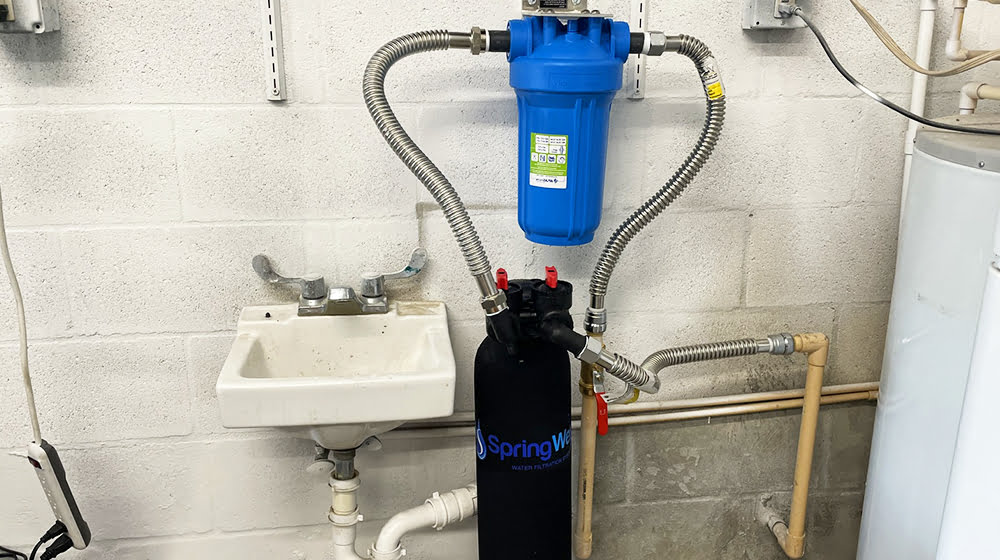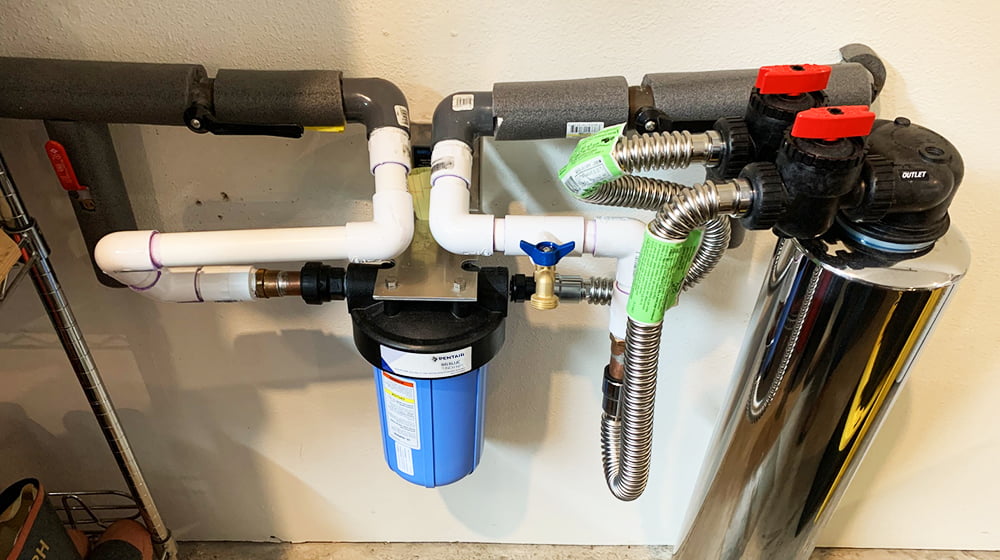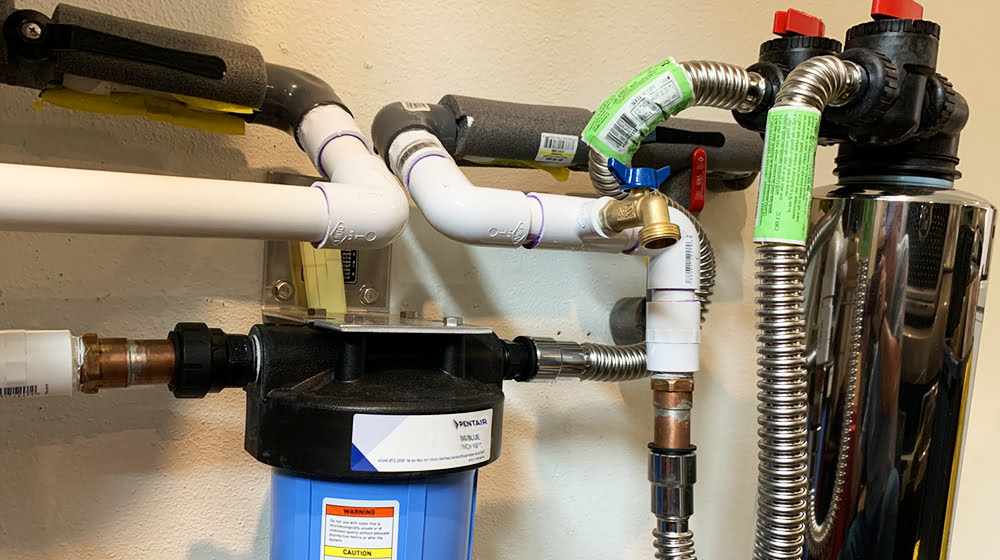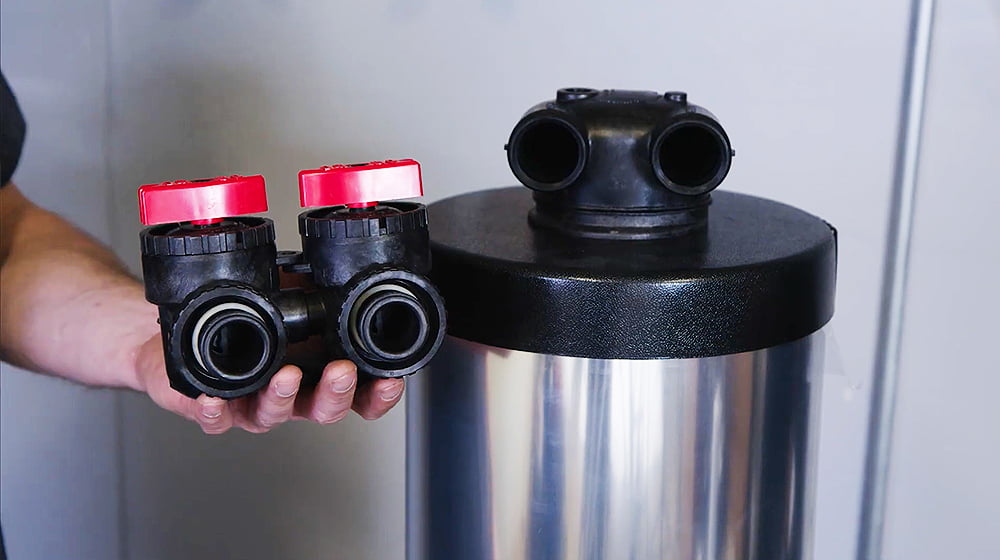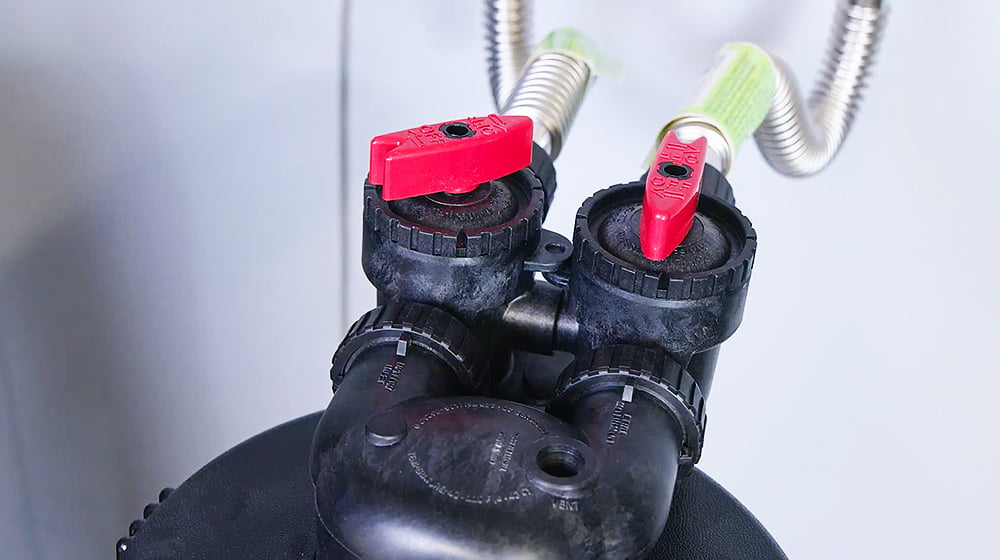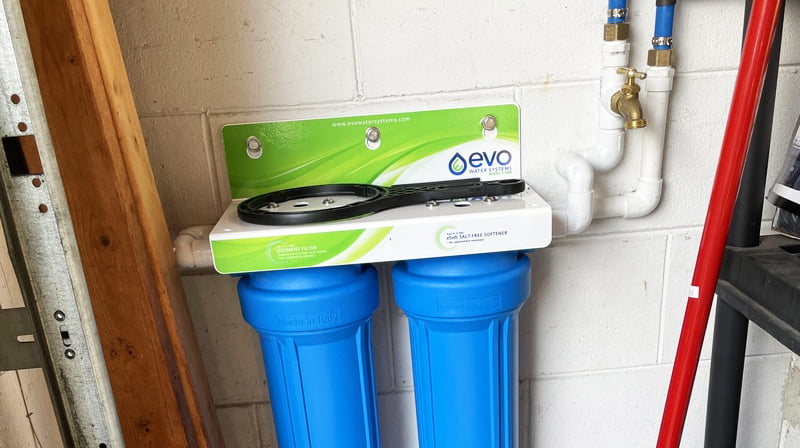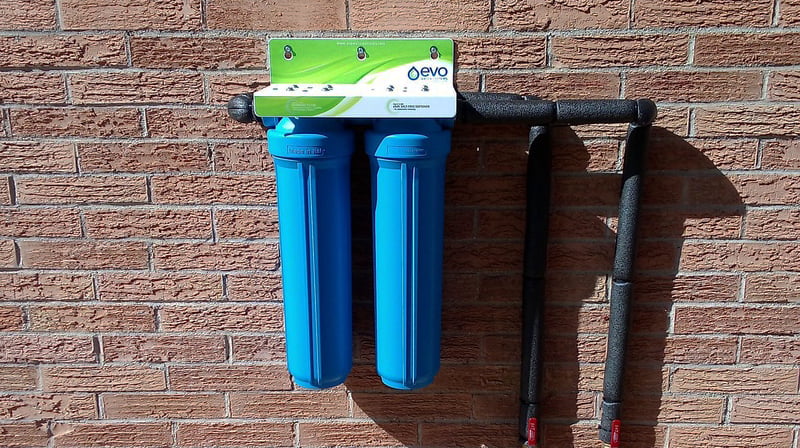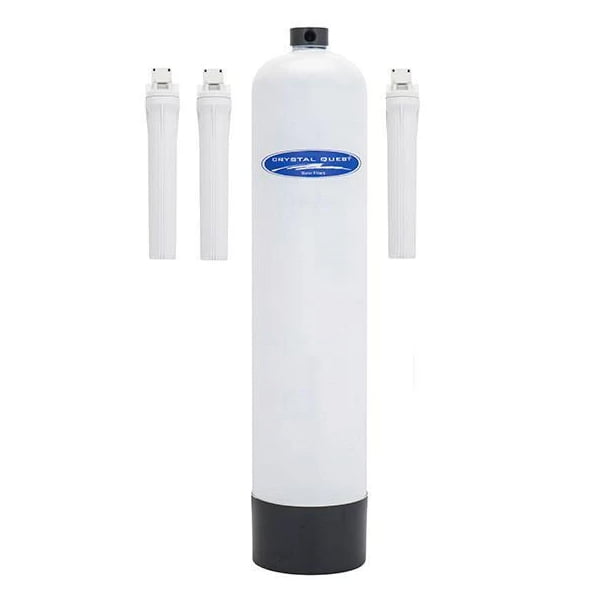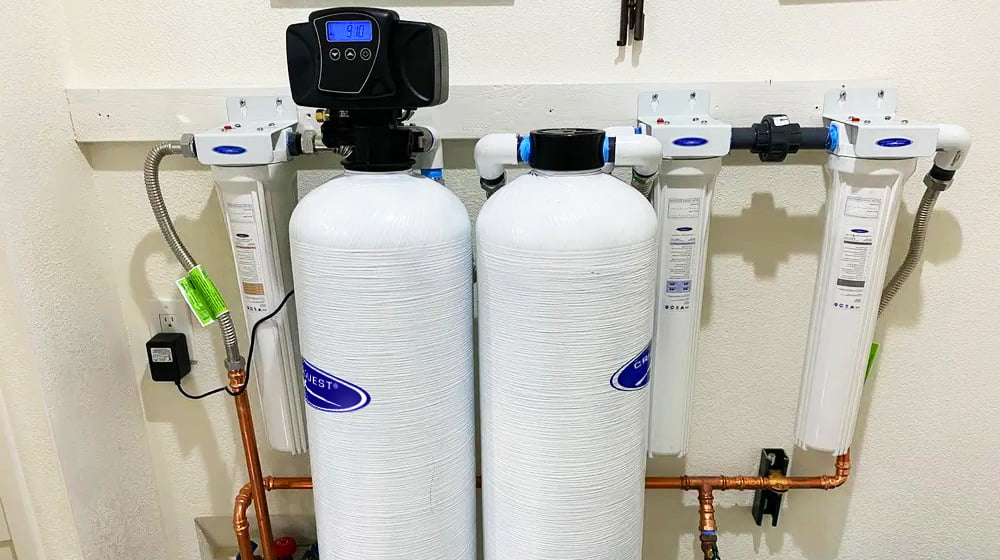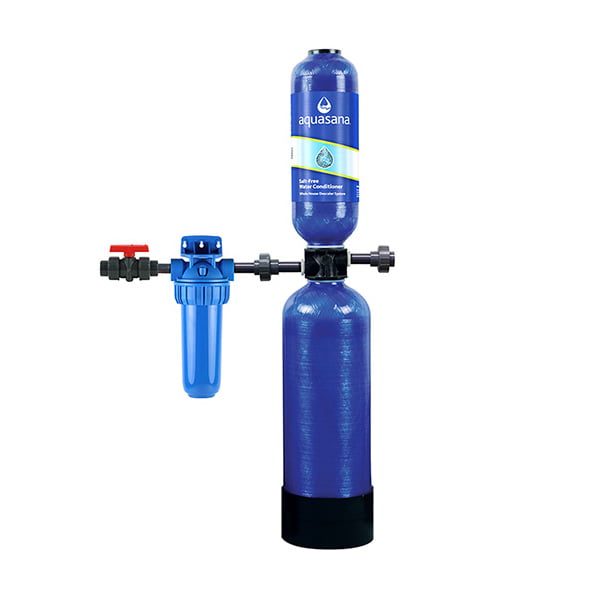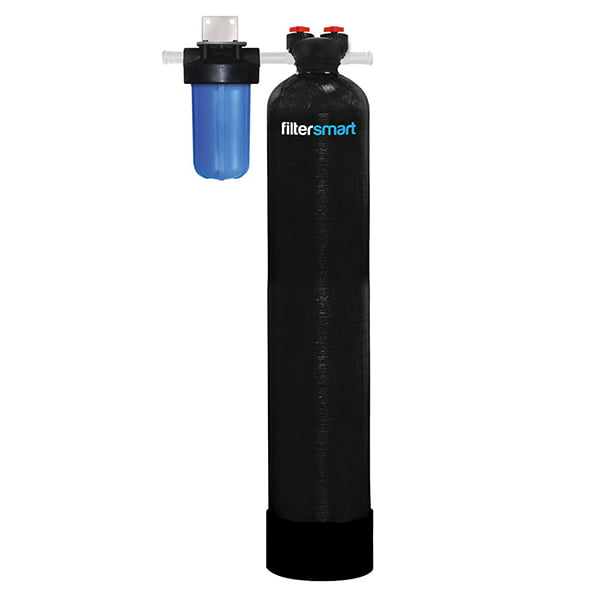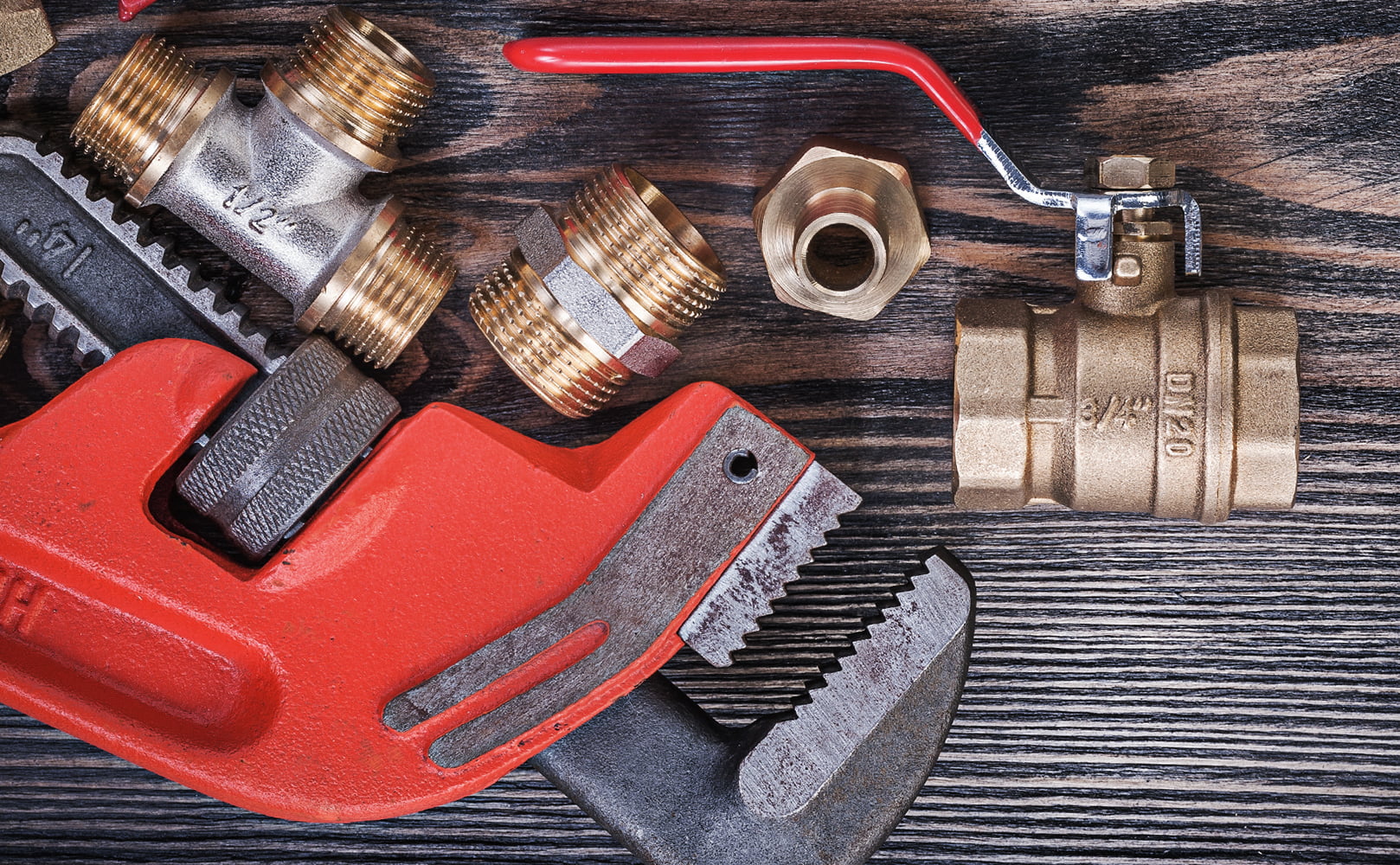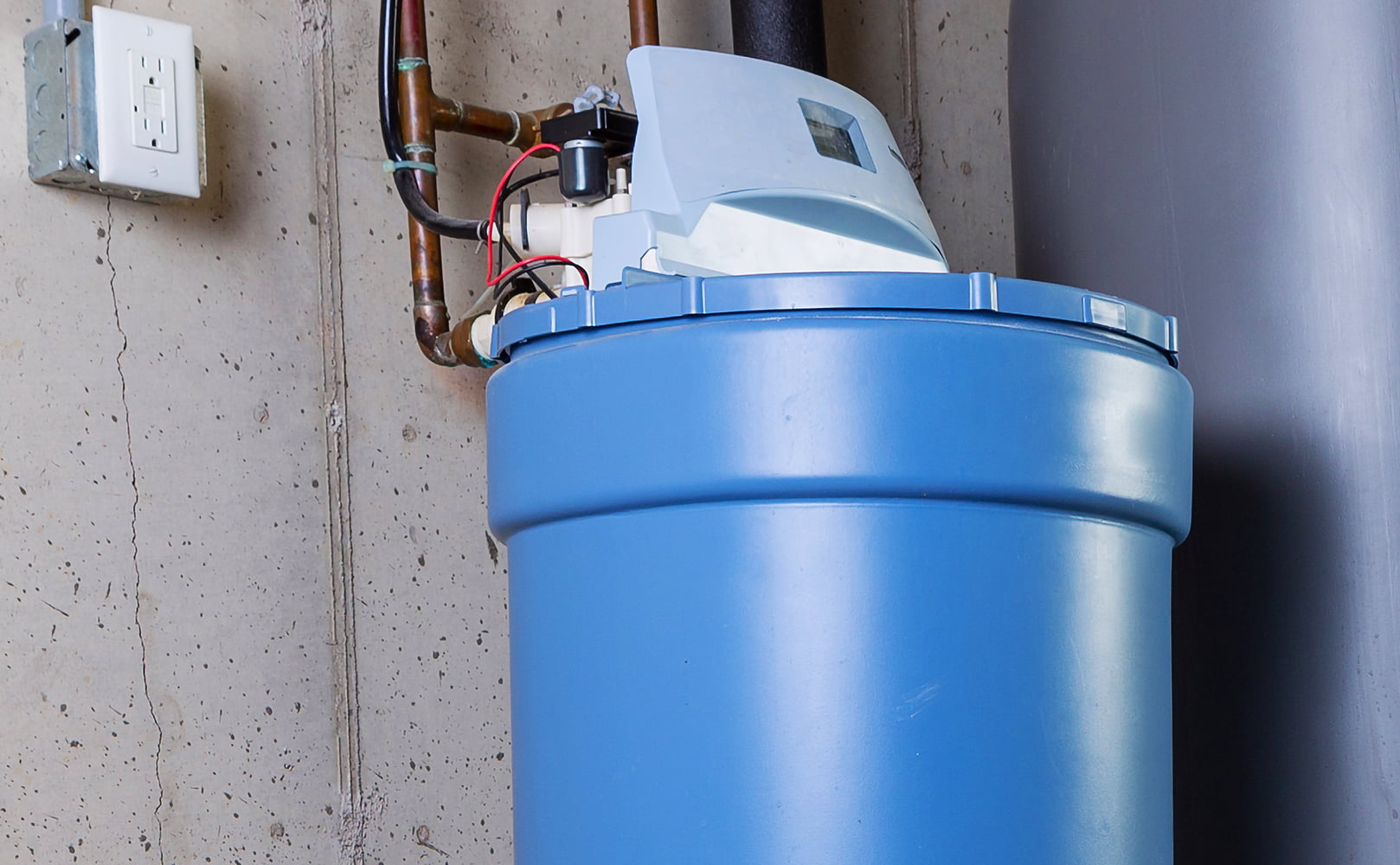8 Best Salt-Free Water Softeners (*Update 2024)
Written by: Alexandra Uta // Expert Fact-Checking: Buddhini Dolapihilla, MBSS // Last Updated: Jan 31, 2024
This page may contain affiliate links. If you buy a product or service through such a link we earn a commission at no extra cost to you. Learn more.
Top Pick: What’s the Best Salt-Free Water Softener?
The best salt-free water softener in 2024 is the SpringWell FS, because it uses time-proven technology to eliminate the scaling effects of hard water protecting your home and family. Also, it is suited for small to large homes, easy to install and maintain, and it comes with a 6-month money-back guarantee and lifetime warranty.
Are you tired of struggling to find the perfect salt-free water softener? Well, look no further! Our team has gone above and beyond to bring you the most comprehensive market analysis.
We started with 15 models, put in countless hours of research, testing, and reviewing, and ended up with 8 salt-free water softeners we think are worthy of your consideration.
No Time to Read? Check Our List of the Best Salt-Free Water Softeners!
| System | Details | |
|---|---|---|
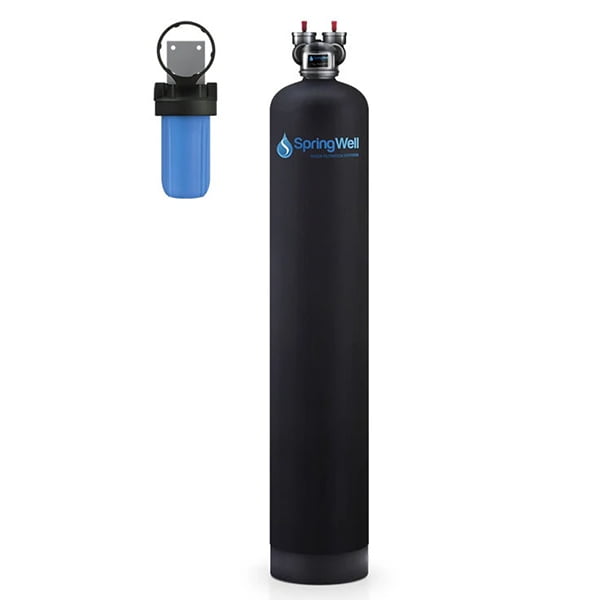 Best Overall: SpringWell FutureSoft |
Overall Rating: 5.0/5.0 ⓘRatings based on effectiveness of treatment, capacity, efficiency, cost, NSF certifications, our testing, user feedback, support, warranties, and other factors.
Get 5% Off! Use Code: |
Price: $$$ Method: TAC System Flow Rate: 12-20 gpm Water For: 1 to 6+ People Warranty: Lifetime (Limited) Read Review: Click Mike’s Video Review: Click |
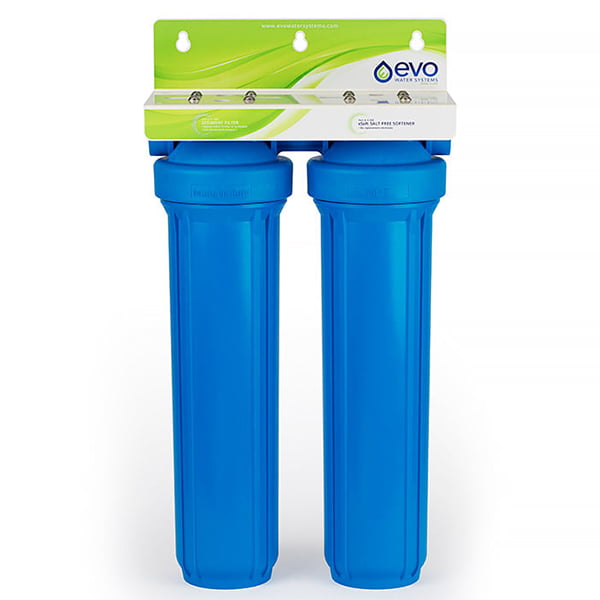 Best Budget Pick: Kind Water Systems E-2000 |
Overall Rating: 5.0/5.0 ⓘRatings based on effectiveness of treatment, capacity, efficiency, cost, NSF certifications, our testing, user feedback, support, warranties, and other factors.
Get 5% Off! Use Code: |
Price: $$ Method: TAC System Flow Rate: Up to 15 gpm Water For: 1 to 6 People Warranty: Lifetime (Limited) Read Review: Click |
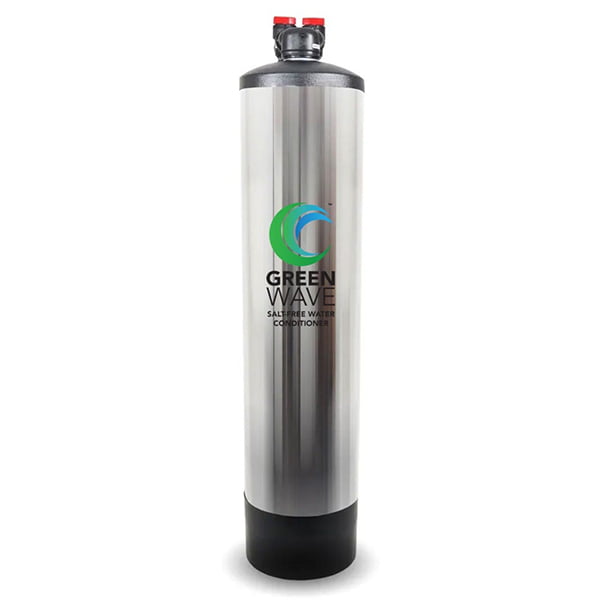 The Runner-Up + Best for Very Large Homes: USWS GreenWave |
Overall Rating: 4.5/5.0 ⓘRatings based on effectiveness of treatment, capacity, efficiency, cost, NSF certifications, our testing, user feedback, support, warranties, and other factors.
Get 5% Off! Use Code: |
Price: $$$ Method: NAC System Flow Rate: 10-25 gpm Water For: 1 to 7+ People Warranty: Lifetime, 4 Years Read Review: Click |
 Best for Electromagnetic Water Descaling: Eddy Electronic |
Overall Rating: 4.5/5.0 ⓘRatings based on effectiveness of treatment, capacity, efficiency, cost, NSF certifications, our testing, user feedback, support, warranties, and other factors.
|
Price: $ Method: Magnetic System Flow Rate: – Water For: For Small to Large Homes Warranty: Lifetime Read Review: Click |
Salt-Free Water Softener Reviews
Our Top Picks
- SpringWell FutureSoft – Best Overall
- US Water Systems GreenWave – Runner-Up and Highest Flow Rate
- Kind Water Systems E-2000 – Best Budget Pick
- Eddy Electronic – Best for Electronic Descaling
- P3 P7920 – Best for Magnetic Descaling
- Crystal Quest – Best for Additional Filtration
- Aquasana SimplySoft
- FilterSmart FS500
1. Best Overall: FutureSoft Salt-Free Water Softener by SpringWell
In our opinion, the best salt-free water softener in 2024 is the SpringWell FutureSoft. That’s because it’s based on Template Assisted Crystallization, short TAC, which has shown to reduce hard water scaling by up to 99.6 percent. (Study)
How does TAC work? Simply put, it uses catalytic media to crystallize mainly calcium and magnesium which are the primary minerals that make up hard water. In their crystal form, these hardness minerals cannot stick to pipes and other surfaces, thus remaining suspended on their entire journey through your home’s water system.
Consequently, your plumbing and home appliances are protected from scaling. And, on top of that, already existing scale formation will gradually dissolve. This will increase the efficiency of your water heater for example, and result in overall longer lifespans with less maintenance work and fewer repairs. #MoneySaver
All other benefits below!
Bottom line: Serious competition for any salt water softener system. 5 stars!
Mike’s Video Review
Mike is one of our inhouse video content producers, and he has ordered, installed, and tested the SpringWell FS Salt-Free Water Softener for us on his own water supply. You cannot get more hands-on experience than that! Mike has documented the entire process and shares his opinion the video below:
Other Specs
- Model: FS1, FS4, FS+
- Last Price: $1542.86-$2567.03
- Max Water Hardness: 81 gpg
- WxHxD: 6-13″x35-54″x6-13″
- Water Temperature: 34-120 °F
- Water Pressure: 20-80 psi
- Water pH: 7.0-9.5
- Fitting: 1-1.5″
Key Features & Pros
- TAC effectiveness has been verified in study conducted by Arizona State University.
- The majority of people are more than happy with their results.
- Up to 81 gpg (grains per gallon) water hardness can be handled, according to manufacturer.
- TAC does not rely on chemicals. No need to worry about the compromising the quality of your drinking water.
- Unlike regular soft water, water processed by the SpringWell FutureSoft doesn’t feel slippery.
- Conditioned water promotes healthy skin and hair due to better lathering of soaps and shampoos.
- Hard water stains may be less obvious and are much easier to clean.
- All essential minerals remain in the water which means they add to your daily nutritional intake.
- Catalytic media bed lasts forever when used as specified and doesn’t require regeneration.
- Saves you a lot of time and money.
- 3 system sizes available to choose from:
- FutureSoft FS1: For 1-3 bathrooms, rated at 12 gallons per minute (gpm) water flow.
- FutureSoft4: For 4-6 bathrooms, 15 gpm.
- FutureSoft FS4: For 7 or more bathrooms, 20 gpm service flow.
- Additional pre-filter removes sediment to protect the catalytic media tank from clogging. Needs replacement every 6-9 months. Average annual cost: About $40-55.
- Designed with DIY install in mind. Instruction manual + explainer video + installation kit are part of the package.
- No maintenance required apart from changing the filter.
- Salt-free water conditioner is covered by 6-month satisfaction guarantee + limited lifetime warranty.
- Outstanding customer support.
Cons
- If water contains iron, manganese, sulfur, copper, or other contaminants that could foul the media bed, pre-treatment is needed.
Our Rating
- Overall Performance: 5.0/5.0
- Softening Capacity: 5.0/5.0
- Purchase Price: 4.0/5.0
- Annual Cost: 5.0/5.0
- Overall: 5.0/5.0
Best for
The SpringWell FutureSoft is best for people who want a salt-free water softener that’s easy to install and use, highly effective, and low-maintenance.
2. The Runner-Up + Best for Very Large Homes: US Water Systems GreenWave Salt-Free Water Conditioner
The USWS GreenWave differs from the SpringWell in 2 aspects:
- It uses NAC (Nucleation Assisted Crystallization) instead of TAC to prevent scaling inside your plumbing.
- It uses a Vortech tank which further boosts the effectiveness of the treatment process.
Should you invest?
Gallery
Other Specs
- Model: GW-100, GW-150, GW-200, GW-250
- Last Price: $1,536.44-$2,381.24
- Max Hardness: 81 gpg
- WxHxD: 9-13″x52.5-58.5″x9-13″
- Water Temperature: 40-110 °F
- Water Pressure: 15-100 psi
- Water pH: 6.5-8.5
- Fitting: 3/4″ or 1″
Key Features & Pros
- Made in USA.
- Catalytic NAC process converts calcium and magnesium ions into harmless microcrystals that stay suspended in the water, thus protecting your plumbing from scale deposits.
- Doesn’t require salt so no added sodium.
- Zero wastewater is eco-friendly.
- No electricity required.
- Filtersorb SP3 media can handle up to 81 grains per gallon water hardness.
- Vortech tank prevents media channeling and provides for even water flow. Also swirls the media for longer contact time with hardness minerals.
- Makes conditioning process even more effective.
- 4 system sizes to choose from:
- GW-100 has a service flow rate of 10 gpm for 1-2 bathrooms.
- GW-150 provides up to 15 gpm ideal for 2 to 3.5 baths.
- 20 gpm (GW-200) is enough to supply 4 to 6 bathrooms.
- GW-250 is for 7 or more bathrooms (25 gpm).
- Easy to install also thanks to built-in bypass.
- No programming required and virtually maintenance-free.
- The media is designed to last 4-6 years.
- You get a lifetime warranty on Vortech tank and tank head. 4 years on the media.
Cons
- Private well water likely needs pre-treatment. Iron above 0.3 ppm, manganese above 0.05 ppm, any sulfur, copper higher than 1.3 ppm, and chlorine above 0.05 ppm need to be removed.
- Basically, any contaminant that could foul the media should be filtered prior.
- The radial flow carbon filter for removing chlorine and other chemicals is optional and costs extra.
Our Rating
- Overall Performance: 5.0/5.0
- Softening Capacity: 4.5/5.0
- Purchase Price: 4.0/5.0
- Annual Cost: 5.0/5.0
- Overall: 4.5/5.0
Best for
The USWS GreenWave system is best for very large homes requiring a high flow rate.
3. Best Budget Option: Kind Water Systems E-2000 Salt-Free Water Softening System
The E-2000 by Kind Water Systems is another legit alternative to the SpringWell FutureSoft salt-free water softening system reviewed above. The biggest difference is that the former is much more affordable. Still, product quality of the cartridge-based unit is nothing short of excellent. Same goes for customer service.
The E-2000, too, uses Template Assisted Crystallization to convert hard water minerals into their crystal form which, most importantly, prevents scale buildup, plus old deposits will vanish over time. The benefits: Water heaters, washing machine, and other appliances last longer and perform at peak efficiency, and your plumbing requires less attention in terms of maintenance and repairs. 5 stars.
Gallery
Other Specs
- Model: E-2000
- Last Price: $1,074.23
- Max Water Hardness: 75 gpg
- WxHxD: 15.5″x29″x8″
- Water Temperature: 36-120 °F
- Water Pressure: 25-120 psi
- Water pH: 6.5-9.5
- Fitting: 1” FNPT
Key Features & Pros
- Built in the USA.
- The process can be used on very hard water with up to 75 grains per gallon hardness.
- TAC media won’t add nor remove anything from your water.
- All essential minerals are preserved.
- No salt, no excess chemicals.
- Salt-free softener does not have to regenerate meaning no water wastage.
- 15 gpm service water flow is ideal for homes with 1-6 bathrooms.
- Comes with a 20-inch sediment filter for high sediment levels.
- Too many sediments can foul the catalytic media bed.
- Change filter every 12 months. Cost: ~$35 per year.
- Shipped with everything assembled in case you want to install yourself.
- Mounting hardware included.
- Completely maintenance-free except for pre-filter replacements.
- 120-day trial period allows you to return the product if you’re not satisfied and receive a full refund.
- System is backed by limited lifetime warranty and A+ customer support for peace of mind.
- Fast delivery.
Cons
- Water must be free from iron and hydrogen sulfide.
Our Rating
- Overall Performance: 5.0/5.0
- Softening Capacity: 4.5/5.0
- Purchase Price: 4.0/5.0
- Annual Cost: 5.0/5.0
- Overall: 5.0/5.0
Best for
The Kind E-2000 is best for people who don’t want to spend a fortune on a high-quality salt-free water softener.
4. Best for Electromagnetic Descaling: Eddy Electronic
The Eddy Electronic is our #1 salt-free, electronic water conditioner in 2024. With its wires wrapped around the incoming water pipe, it induces electromagnetic waves which eliminate the scaling effects of hard water by approx. 50 percent (tested in a scientific study).
Furthermore, the remaining half of the scale is less persistent and can be wiped off easily. 4.5 stars!
Other Specs
- Model: ED6002P
- WxHxD: 6.75″x3.5″x1″
- Certifications: CE & FCC
Key Features & Pros
- The Eddy Electronic is highly affordable compared to salt-free water softening systems on top.
- Cost for electricity is negligible.
- Unit comes with 2 wires to be wrapped around the incoming water supply line (both on cold, or one on cold and one on hot water line). The wires generate electromagnetic waves that alter the adhesion properties of hard water ions so that they won’t stick to water pipes etc.
- All healthy minerals are retained.
- Works with both city water and well water.
- According to the company, hard water levels of up to 20 grains per gallon can be handled.
- Attention: Maximum allowed pipe diameter is 1.5 inches.
- Easy to install within a few minutes, no plumbing involved.
- Designed for tight spaces.
- Virtually maintenance free.
- Certified to international safety standards (CE + FCC).
- Risk-free satisfaction guarantee for 1 year that allows you to return the product for a full refund.
- Lifetime repair + replacement warranty.
Cons
- A small proportion of users said they saw no positive effects.
- Does not work with iron and galvanized pipes.
Our Rating
- Overall Performance: 4.0/5.0
- Softening Capacity: 5.0/5.0
- Purchase Price: 5.0/5.0
- Annual Cost: 5.0/5.0
- Overall: 4.5/5.0
Best for
The Eddy Electronic is best for people who want an affordable electromagnetic unit to solve their hard water problem.
5. Best for Magnetic Descaling: P3 P7920
The P3 P7920 may sound like a robot, but in reality it’s a salt-free softening system that makes use of magnets to, just like the Eddy Electronic, induce a magnetic field into the water. The ionic minerals in the water form relatively large crystals which are less likely to attach themselves to whatever surface they touch. In regards to effectiveness, we’re talking about one-third to one-half reduced scale build-up.
Taking into account the extremely low price tag, it’s 3.5 stars from us!
Other Specs
- Model: P3 P7920
- Pipe Diameter: 3/4″
- WxHxD: 7.75″x1″x2″
Key Features & Pros
- Super cheap. Nothing can beat the P3 as far as pricing is concerned.
- Permanent magnets are built into two plastic halves which wrap around the incoming water pipe.
- Setup couldn’t be easier.
- Highly compact, perfect for tight places.
- Maintenance-free.
- 10-year warranty.
Cons
- Salt-free softener is only compatible with ¾-inch pipe diameter.
- Not everyone saw a positive effect.
Our Rating
- Overall Performance: 3.0/5.0
- Softening Capacity: 5.0/5.0
- Purchase Price: 5.0/5.0
- Annual Cost: 5.0/5.0
- Overall: 3.5/5.0
Best for
The P3 P7920 is best for people who want to give magnetic water conditioning a try.
6. Best for Additional Filtration: Crystal Quest Salt-Free Whole House Water Softener
The Crystal Quest saltless water softener is another system applying TAC – because it’s the most effective water softening process that doesn’t involve salt. Again, possible scale reduction is well above the 90 percent mark. On top of that, old buildup in pipes etc. will disappear sooner or later.
What distinguishes the Crystal Quest from its competitors is that it not only includes pre- but also post-filtration for conditioned water that’s also healthy to drink with great taste. Everything is Made in USA so your budget has to be accordingly high. 4 stars.
Gallery
Other Specs
- Model: CQE-WH-02132, CQE-WH-02133
- Last Price: $2,147.00-$2,393.00
- Max Water Hardness: 25 gpg
- Water Temperature: 35-100 °F
- Water Pressure: 20-60 psi
- Fitting: 3/4″ or 1″
Key Features & Pros
- Water Softening + Water Filtration System.
- Pleated 20-inch sediment pre-filter rated at 5 microns removes large particulates. Prolongs life of the softening resin.
- Stage two uses catalytic anti-scale media to eliminate scaling effects of hard water. All benefits are as mentioned above.
- 20-inch coconut shell carbon filter block removes VOCs, pesticides, bad taste and odor, and all kinds of chemicals.
- 20-inch ultrafiltration cartridge rated at .2 microns filters colloids, microorganisms including bacteria and viruses, organics , and “most other water contaminations known today” (source: Crystal Quest).
- Optional: Upgrade fiberglass to stainless steel tanks for longevity.
- More time-consuming and not as easy to install due to the additional water filter stages.
- Low maintenance requirements.
- Pre- & post-filters last between 1 and 3 years. Average annual cost: $80-$125.
- Catalytic softening media lasts up to 10 years.
- Crystal Quest 1-year warranty.
Cons
- Pre-treatment of water might be necessary in case of elevated iron, manganese, copper, phosphate, or hydrogen sulfide levels.
- Talk to Crystal Quest support team about this.
Our Rating
- Overall Performance: 4.0/5.0
- Softening Capacity: 5.0/5.0
- Purchase Price: 3.5/5.0
- Annual Cost: 5.0/5.0
- Overall: 4.0/5.0
Best for
The Crystal Quest is best if you want salt-free water softening in combination with effective pre and post-filtration.
7. Aquasana SimplySoft Salt-Free Water Treatment System
Our second to last saltless water softener review features the Aquasana SimplySoft which uses scale control media to “naturally” counter the negative effects of hard water. Our guess is that the process is very similar, possibly identical, to what SpringWell and the other TAC water conditioning systems do: Convert ionic hard minerals into crystals which stops them from binding to surfaces – think hard water scale prevention (more details above).
Other Specs
- Model: WH-SFWC-S
- Last Price: $799.00
- Max Water Hardness: 20 gpg
- Service Life: Up to 1,000,000 Gallons or 10 Years
- WxHxD: 32″x46″x9″
- Water Temperature: 40-90 °F
- Water Pressure: 20-100 psi
- Fitting: 3/4″ or 1″
Key Features & Pros
- 20″ sediment filter removes large solids. Protects the large softening/conditioning tank.
- Replace every other month. Cost: $60 per year.
- 10″ sediment post-filter removes leftover sediments and certain organics.
- Replace every 6 months. Cost: $60 per year.
- Suited for DIY installation.
- 90-day satisfaction guarantee has you covered in case you’re not happy with the results. Send back the Aquasana SimplySoft for a full refund.
- 10-year warranty.
Cons
- Product has received a considerable amount of bad reviews.
- Most importantly, people complained about the softening capacity declining rather quickly. Aquasana says you can use the system for up to 10 years. Some reviewers said theirs stopped working after 6 months to 1 year.
- Not the right system in case of extreme water hardness. Maximum recommended hardness level is 20 gpg but system works best at 15 gpg or below.
- 7.0 gallons per minute service water flow is too low for larger households. Up to 2 bathrooms is okay and should not cause low water pressure.
- Aquasana SimplySoft lacks built-in bypass.
- Changing the filter can get a little messy.
Our Rating
- Overall Performance: 3.5/5.0
- Softening Capacity: 3.5/5.0
- Purchase Price: 4.0/5.0
- Annual Cost: 4.5/5.0
- Overall: 3.5/5.0
Best for
Aquasana’s SimplySoft is best for people with limited budgets that are living in smaller homes.
→ Full Aquasana SimplySoft Review
8. FilterSmart FS500 Salt-Free Water Conditioner with Pre-Filtration
The main reason to opt for FilterSmart when shopping for a salt-less water conditioner is cost saving. How much is the price difference? Up to a few hundred dollars depending on which competitor model you use for comparison – not bad at all!
What’s more, the FilterSmart FS500 uses the exact same tried and tested technology we also find in SpringWell systems.
On the downside, a FilterSmart naturally cannot compete with the cream of the crop in regards to overall quality. Plus, just like other people we have had trouble dealing with the company!
Other Specs
- Model: FS500
- Last Price: $1,250.00-$1,899.00
- Service Life: 1,000,000 Gallons or 5 Years
- WxHxD: 9-10″x48-54″x9-10″
- Water Temperature: 39-120 °F
- Fitting: 1″
Key Features & Pros
- Salt-less water softener renders calcium and magnesium in hard water harmless by converting them into nano crystals. Study has shown up to 99.6% scale prevention throughout the entire home + existing deposits are cleared up eventually.
- Extremely efficient regardless of gpg water hardness level, says manufacturer.
- Even water flow thanks to Vortech-style tank causing zero channeling and extended contact time with the water for a more effective process.
- Catalytic media bed lasts 5 years or 1,000,000 gallons, regeneration-free.
- All other benefits as listed above.
- Depending on the size of your household, choose between:
- Small water system: For 1-3 bathrooms, rated at 12 gallons per minute (gpm) water flow.
- Large water system: For 4-6 bathrooms, 15 gpm.
- String-wound filter pre-conditions the water removing sand, silt, rust and other sediments to protect the large conditioning tank from clogging/fouling.
- Replace once or twice a year. Cost (annually): $23-39.
- You can upgrade the black fiberglass tank with a stainless steel cover for protection.
- All parts are NSF/WQA-certified.
- You can do the installation yourself. All parts needed are included in the package.
- Maintenance-free!
- Money-back guarantee for the first 90 days after purchase + lifetime product warranty.
Cons
- Feed water should meet the following conditions:
- Ferrous ≤ 0.3 ppm.
- Manganese ≤ 0.05 ppm.
- Copper ≤ 1.3 ppm.
- Sulfur and other contaminants that could foul the Catalytic TAC media bed also need to be removed during pre-treatment.
- We read reports about lackluster support and have experienced similar issues ourselves.
Our Rating
- Overall Performance: 2.0/5.0
- Softening Capacity: 3.5/5.0
- Purchase Price: 4.5/5.0
- Annual Cost: 5.0/5.0
- Overall: 3.0/5.0
Best for
The FilterSmart FS500 is best for salt-free water softening on a budget.
Comparison List
(Mobile Hint: Swipe to Scroll)
| Systems | Price | Type | Max GPG | GPM | People | Warranty | Additional Info |
|---|---|---|---|---|---|---|---|
| SpringWell FutureSoft Salt-Free System | $$$ | TAC | 81 | 12-20 | Up to 6+ | Life (Limited) | |
| USWS GreenWave Salt-Free Water Conditioner | $$$ | NAC | 81 | 10-25 | Up to 7+ | 4 Years to Life | |
| Kind E-2000 Treatment System | $$ | TAC | 75 | 15 | Up to 6 | Life (Limited) | |
| Eddy Electronic Salt-Free Water Softener | $ | Electronic | Not Specified | – | – | Lifetime | |
| P3 P7920 Magnetic Water Softener | $ | Magnetic | Not Specified | – | – | 10 Years | |
| Crystal Quest Salt-Free Water Softener (with Pre and Post Water Filters) | $$$ | TAC | 25 | ? | Up to 6 | 1 Year | |
| Aquasana SimplySoft Salt-Free Water Softener | $$ | SCM | 20 | 7 | Up to 3 | 10 Years | |
| FilterSmart FS500 Salt-Free Water Softener | $$$ | TAC | Not Specified | 12-15 | Up to 6 | Life |
Buying Guide: How to Choose the Saltless Water Softener That’s Best for You
The following are key features worth considering when shopping for a salt-free water softener. They will help you choose the right on for your needs and budget.
System Types (Technology) + Cost
There’re many different types of saltless water softeners. Personally, we favor systems using catalytic TAC media. That’s because they’re the most effective and don’t release anything into the water nor do they remove anything. The only downside is that this type of water softener is also the most costly.
Then we have systems which add a chemical additive to the water, such as citric acid or polyphosphate. Honestly, these are not our preferred choice. We simply don’t like the thought of consuming water that contains any kind of additive. Cost: Medium to high.
And lastly, (electro-)magnetic units – nowhere near as effective as TAC models but really affordable.
Water Parameters
You need to double-check that your water meets the necessary conditions set by whichever salt-free softener you’re eying. Potential parameters may include a certain water pH range or temperature, and low iron, sulfur or manganese content.
Water Flow Rates
POE water treatment systems allow for a certain maximum flow rate. Your demand should not exceed this threshold even at times of peak consumption or you might experience a water pressure drop or have unconditioned water bleed through.
Here’s what most industry experts recommend:
- At least 12 gpm water flow rate for household with 1 to 3 bathrooms.
- At least 15 gallons per minute for homes with 4 to 6 bathrooms.
Ease of Installation & Maintenance
If you’re handy with tools you should be able to hook up any water softening/conditioning system provided you have enough time and patience. Tip: Flex tubing combined with shark bite fittings save you from soldering and make the whole process a lot faster and easier.
With most systems you also don’t need to worry about installing an extra bypass as they already have one built in.
As far as maintenance goes, there’s usually not much to do, maybe replace a sediment filter every once in a while.
In case you prefer installation by a professional, expect to pay a few hundred extra bucks.
By the way, everything of the above doesn’t apply to the Eddy, the P3, and similar products. They can be installed in under 10 minutes and don’t need to be looked after – it’s set and forget!
Dimensions
Electronic and magnetic units being the exception, salt-free water softeners are larger than you might think. Make sure there’s enough room in your garage or basement to install one.
Seller + Warranties
We prefer sellers that
- offer a trial period with all their products which guarantees the buyer a full refund if he or she is not satisfied.
- back their systems with a lifetime warranty.
- provide US-based, technically-versed customer support.
More on Salt-Free Softeners
What Is a Salt-Free Water Softener/Conditioner?
Traditional water softening systems use salt to make hard water soft, meaning they remove calcium, magnesium, and other hard minerals from the water in a process called ion exchange. Although being highly effective, this method of softening water has several disadvantages.
For one, a regular water softener has to regenerate on a frequent basis. This means backwashing the resin bed to flush out all accumulated hard water ions and recharging the small resin beads with sodium (in some cases potassium). This wastes a considerable amount of water and releases excess salt into your water supply which will eventually end up in the environment. Another drawback is that you have to buy new salt bags on a continuous basis.
This is why engineers came up with the concept of salt-free water softeners. These don’t actually remove the minerals from hard water, however, they reduce or completely eliminate their scaling effects which is just what regular water softeners are doing.
The Different Types of Saltless Water Softeners and How They Work
As mentioned above, there are various types of saltless water softeners. They come in all shapes and sizes and are based on different technologies. In other words, not all saltless water softeners work the same way.
Side note: Reverse osmosis and other water filtration systems are not intended to soften water. Salt-free softeners, salt-based softeners, and water filters will all treat the water in your home but in different ways.
TAC
By far our favorite type are systems using Template Assisted Crystallization (TAC), due to their unmatched performance and ease of use. We’ve already explained how the salt-free technology works in one of the reviews above. In a nutshell: Water flows through a catalytic media which causes all calcium and magnesium ions to crystallize so they stay suspended in the water. TAC has shown to prevent scale buildup by more than 99% when applied right.
Chelation
Some saltless water softeners add chelating agents to the water. Two examples are the Aquios water systems which use a polyphosphate and NuvoH2O which add citric acid. However, customer feedback for systems working with chelation is mixed at best.
(Electro-)Magnetic
And lastly, electric respectively magnetic no-salt water conditioners also known as water descalers. They use electricity or plain magnets to alter the adhesive properties of calcium and the like by creating a magnetic field in the water supply. Here, too, overall effectiveness is rather limited.
Advantages & Disadvantages of Using a Salt-Free Water Softener System
Benefits of Salt-Free Systems
Salt-free water conditioners have many benefits, most importantly scale prevention. This protects your home’s plumbing and appliances. Above that:
- They remove existing hard water scale, contrary to true water softeners.
- Hard water spotting may reduce. Any remaining scale build-up is soft and wipes off easily.
- Some users reported skin and hair + laundry look and feel much better.
- Compared to traditionally softened water, the conditioned water doesn’t feel slippery.
- Mineral content present in the water won’t be altered and adds to your daily nutritional intake.
- Salt-free softeners don’t need to regenerate. This saves a lot of resources, especially water which is eco-friendly. Not releasing any excess salt is another environmentally-friendly aspect. Speaking of, without salt you don’t need to heave heavy salt bags or worry about sodium in your drinking water.
- They’re relatively easy to install if you’re a DIYer.
- With most models you don’t have to worry about maintenance at all.
- There’s no softening media to replace every couple of years.
- Salt-free systems are the only option in communities where true water softeners are banned.
Disadvantages
- Eco-friendly or not, the general consensus among experts is that, overall, salt water softeners applying an ion exchange process are more effective than their salt-free counterparts.
- Water softeners that use salt tend to perform better at higher water hardness levels than most salt-free softeners.
- Not all people are satisfied with their system. Most of them complain about not seeing any or only marginal effects.
Salt vs. Salt-Free Water Softeners
Which is better salt or saltless water softener is a question we get asked quite often. Again, there’s no doubt that the former is more effective than the latter.
That said, saltless softener systems have their own benefits which are listed right above. Most importantly, they also remove existing scale deposits which is something no salt water softener system can do.
Remember: It’s Not Soft Water
Last but not least, we want to make very clear that water treated with a salt-free system is not soft water in the real sense. With soft water, all hard water minerals have been removed. Salt-free conditioners can only reduce the scaling effects of hard water without actually taking out any calcium or magnesium.
Where’s the difference? Well, there’s no guarantee that all your hard water problems will get resolved: That your soap and shampoo usage goes down; that your clothes become whiter, brighter and softer; and that you see a difference in spotting.
Frequently Asked Questions (FAQ)
- How can salt-less softeners remove hard minerals without salt?
Salt-less units don’t actually remove the minerals, they only prevent scale formation. - Is soft water healthy?
In most cases it is. - Does a whole house salt-free system work with both tap water and well water?
Yes, these kinds of water systems can be used with city water and well water. - Do I need to do a water test?
A thorough water analysis always makes sense!
How We Chose and Tested the Best Salt-Free Water Softeners (Why Trust Us)
Our approach to evaluating salt-free water softeners is based on a clearly defined process:
- We carefully selected 16 essential attributes to evaluate each salt-free water softener product.
- We started with 15 systems.
- We thoroughly examined product manuals, descriptions, and third-party certifications.
- We reached out to the companies directly to test their product support.
- We analyzed user feedback, sorting out genuine reviews from deceptive ones.
- We ordered, installed, and tested some (not all!) of the 9 remaining salt-free water softeners on a real hard water supply for 4+ weeks. Things we paid attention to: Ease of installation, maintenance needs, footprint, flow rates, taste and smell of treated water, cloudiness, signs of discoloration, and more.
- We crunched the data, analyzed the results, and presented our findings in a user-friendly format.
Rest assured, our guide is unbiased and fact-checked (Buddhini Dolapihilla, MBSS has reviewed everything from a scientific background). We’re here to help you make an informed decision without any confusion.
About Our Ratings
Currently, our salt-free water softener evaluation is mainly based on: The reduction of hard water scaling (30%), service life (20%), water flow rates (15%), costs (15%), testing and user opinions (10%), product warranty & customer service (10%).
We’ve rated each softener on a score of 1 to 5, with 5 being the highest rating.
Questions? Ask away!
Information provided on BOS is for educational purposes only. The products and services we review may not be right for your individual circumstances.
We adhere to strict editorial guidelines. Rest assured, the opinions expressed have not been provided, reviewed, or otherwise endorsed by our partners – they are unbiased, independent, and the author’s alone. Our licensed experts fact-check all content for accuracy. It is accurate as of the date posted and to the best of our knowledge.

